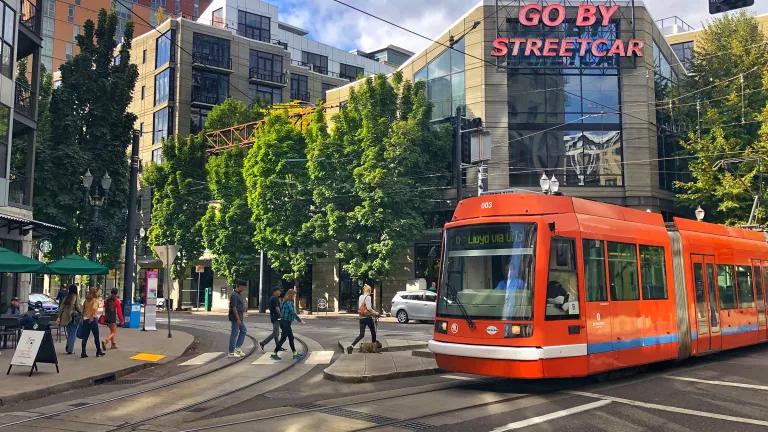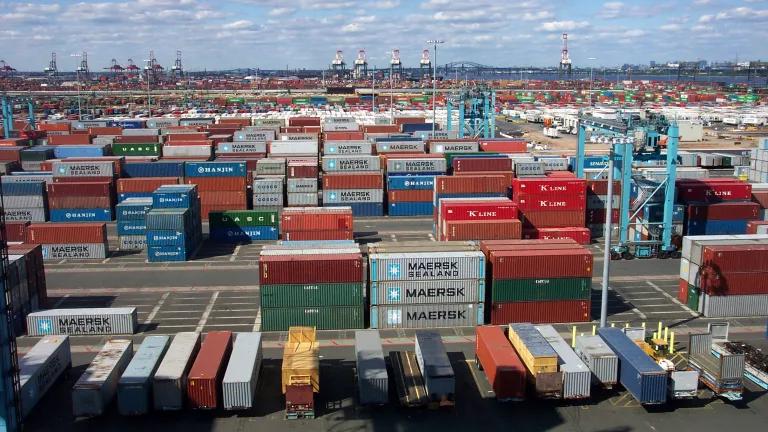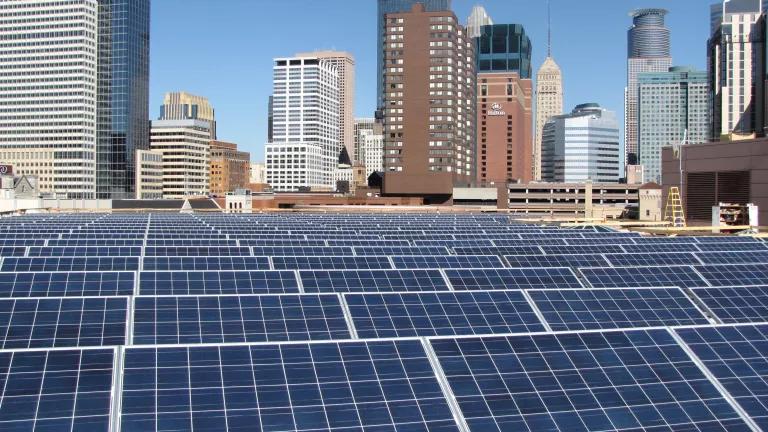Will Congress Prioritize Sustainable, Equitable Transportation for FY 2025?
Continued investment in priority programs will be crucial to ensuring that the Bipartisan Infrastructure Law meets its climate and equity goals.

Another day in the Pearl District of Portland, Oregon
Transportation is the single-largest carbon polluter in the United States and federal appropriations negotiations for fiscal year (FY) 2025 provide a ripe opportunity to set the stage for the creation of a low-carbon and equitable transportation system.
The federal transportation infrastructure law, and transportation spending more generally, has historically favored highway-centric investments, leaving little sustainable funding for more climate-friendly options like public transit, micromobility, or bicycle/pedestrian infrastructure. For many years, the federal surface transportation program has made just 20 percent of total funding available for public transit, largely as a matter of tradition rather than the result of any real attempt to achieve particular policy goals. Additionally, in the last 20 years, the single-biggest source of transportation funding, the Highway Trust Fund (HTF), has dedicated just around 13 percent of total revenues to transit.
Ongoing investment in highway expansion is of particular concern and demands increased scrutiny from lawmakers. Spending to widen highways not only increases climate and localized air pollution by increasing the number of vehicles that use those highways (via a well-documented phenomenon known as “induced demand”) but also too often harms communities that have historically been divided by transportation infrastructure and have shouldered the disproportionate transportation pollution burdens. A lack of access to sustainable and affordable transportation options leads to a separation of communities from key job centers and basic daily services, fundamentally impacting the economic mobility of these communities.
The Bipartisan Infrastructure Law (BIL) attempts to address this gap between highway investments and spending on sustainable and equitable transportation by creating several popular climate-centric and community-focused programs to support the expansion of clean transportation. While the infrastructure law established many of these programs, the annual appropriations process determines the level of funding each program is provided for administration and award purposes. These programs will be negotiated in the House and Senate as part of the Transportation, Housing, and Urban Development appropriations bills.
This year, the appropriations process is constrained by the Fiscal Responsibility Act, which limits increases in overall spending and severely constrains what Congress can do to ensure that key programs are funded at their BIL-authorized levels. Despite these difficult financial circumstances, NRDC considers the following programs to be critical to redirecting the flow of transportation dollars toward equitable low-carbon transportation projects. The funding levels articulated below represent what is needed for the programs to meet their full potential, and we are eager for Congress to maintain the foundation of support that these programs need to operate effectively in FY 2025.
Capital Investment Grants (CIG) Program: The CIG Program is the single-largest pot of funding available for expanding public transportation and will be critical to ensuring universal access to high-quality public transportation. Public transit is disproportionately used by Black and Latine communities and low-income households as a primary mode of transportation, and continued investment in public transit systems will help to increase access to clean transportation, health care, and other services, and improve the economic development of these communities. Nevertheless, CIG has been subject to cuts in previous budget negotiations processes, and this gradual reduction in allocated funding is counterproductive to the climate goals of the BIL. NRDC would like to see this program funded at $2.4. billion for FY 2025, consistent with the ask in the president’s FY 2025 Budget.
Thriving Communities Program: The Thriving Communities Program was created in the FY 2022 Consolidated Appropriations Act and is an initiative to help disadvantaged, rural, and tribal areas develop and deliver transformational transportation and community revitalization projects. The program was designed to provide communities with technical expertise and the capacity to compete for grants, authorized as part of the infrastructure law, that help them meet their economic and community goals. The program received $25 million in funding in FY 2022 and FY 2023 but was zeroed out in FY 2024 negotiations, despite being oversubscribed. In FY 2023 alone, the U.S. Department of Transportation received 229 letters of interest for technical assistance and eventually selected 112 communities to support. Applications came from a broad cross section of communities, including rural and tribal communities from Alaska to Louisiana. Given the need for and the growing community interest in this program, NRDC advocates for an increase in funding to $75 million for FY 2025 to help more people access safe mobility choices, affordable housing, and economic opportunity, yielding long-term results for distressed communities across the country.
Reconnecting Communities Pilot: The Bipartisan Infrastructure Law established a new discretionary grant called the Reconnecting Communities Pilot, the first program of its kind dedicated to reconnecting communities to economic opportunities by correcting past transportation infrastructure decisions. This grant can be used to support planning, capital investments, and technical assistance.
Federal highway funds have long been used to construct highways that segregated Black and Latine communities. Highways have isolated Americans on the basis of race, national origin, and income from public facilities, services, quality schools, and jobs located outside the boundaries of residents’ immediate neighborhoods. This has caused direct displacement of homes and businesses and lasting harm in the form of physical barriers within and between communities, in addition to the disproportionate air and noise pollution burdens. For example, homes and businesses in the impacted Black and Latine communities have vastly lower property value than white communities.
The infrastructure law authorized $1 billion in funding from FY 2021–2026. NRDC would like to see this program funded at its BIL-authorized level of $102 million for FY 2025.
RAISE Discretionary Grants: The BIL set aside $1.5 billion annually for the Rebuilding American Infrastructure with Sustainability and Equity (RAISE) Discretionary Grant program through FY 2026. This pot of money has been known in the past as the Better Utilizing Investments to Leverage Development and Transportation Investment Generating Economic Recovery Discretionary Grants and is directed toward passenger and freight surface transportation projects that have significant regional or local impact on equity, climate benefits, and wealth creation, among other criteria. RAISE grants, therefore, are an important source of funding for efforts to create clean, accessible, and equitable transportation systems. In addition to capital projects, these grants can cover a wide array of planning efforts, including equity planning and feasibility studies, as well as the creation of comprehensive master plans. NRDC supports funding this program at its BIL levels.
As Congress starts negotiations on FY 2025 appropriations, the call for climate-friendly and equity-focused initiatives grows ever more urgent. Prioritizing wasteful and ineffective highway expansions over cleaner, fairer transportation options has worsened emissions, congestion, and systemic inequalities. The Bipartisan Infrastructure Law presents an opportunity to shift this trajectory, with programs like the Capital Investment Grants Program, the Thriving Communities Program, the Reconnecting Communities Pilot, and RAISE Discretionary Grants paving the way for change.


